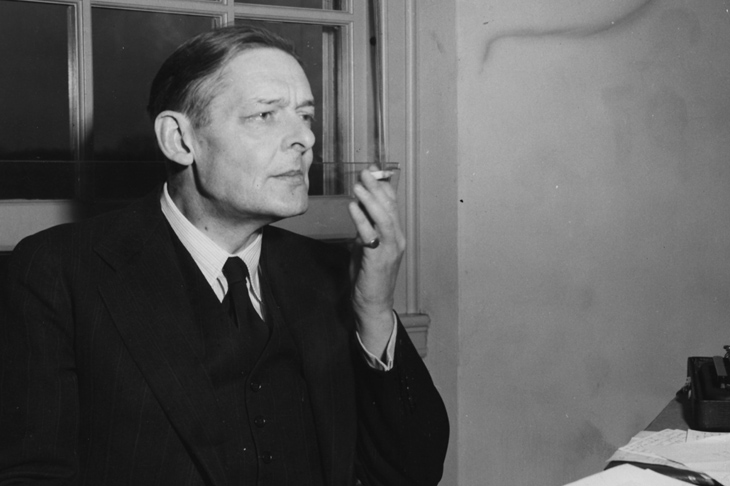Eliot. After 50 years trying to make sense of his verse, and at the risk of admitting to rampant philistinism, I propose three conclusions. At his best, he is one of the finest poets in the language. Partly because he is straining language and thought to the uttermost — an analogy with the final Beethoven piano sonatas — he is sometimes incomprehensible: sometimes, indeed, falls into arrant pseudery. Finally, his anti–Semitism before the war, his rejection of Animal Farm after it: this great man and devout Christian was not exempt from original sin.
Gerontion. ‘The Jew squats on the window sill, spawned in some estaminet of Antwerp.’ We turn our eye from the page in revulsion and pity. Even before Auschwitz, how could one of the finest sensibilities of our era have written that? A few lines later: ‘After such knowledge, what forgiveness?’ Truly, this was a man of sorrows and acquainted with grief. Much can be forgiven to such a tortured soul.
England. Eliot may have moved to England and embraced Englishness: ‘History is now and England.’ But he could never immerse himself in the clod-hopping stolidity of the England deep-down things: the pint of beer in the country pub, the discreet cleverness of an Englishman who pretends to be anti-intellectual and turns out to have read a lot of books — the ‘Dearly Beloved’ in church on Sunday. In England at its best and wisest, there is a eupeptic stoicism, an understanding that life is far too important to be taken seriously. Poor Eliot: he could never escape for long from seriousness.
Macavity. All that said, there are the cat poems. Necessary light relief after you have been trying to fight your way across The Waste Land, they must also have been light relief for him: his version of Dearly Beloved. ‘In my beginning is my end.’ I started to read Eliot as a pretentious schoolboy who thought that it would be easy to understand the human condition. Half a century later, in sight, I suppose, of ‘In my end is my beginning’, it is more a matter of ‘These fragments I have stored against my ruins.’ But I shall grapple with Eliot as long as my wits endure.
‘Voluptuary sweetness.’ Those thoughts, welcome, self-indulgent, unwelcome, forced themselves upon me after a tasting of white 2015s from Bernard Vallet and the house of Pierre Bourrée. In 2015, the sun burst forth over Burgundy with its benefactions. The result was a Ceres, a Proserpine of a hugely ripe vintage, like a voluptuous girl painted by Titian or Rubens, with the obvious risk of blowsiness. But there is an advantage. The lesser wines are ready for early drinking. Thus it was with Bernard’s bottles.
‘Midwinter spring is its own season.’ On a filthy evening in February, while one might be fighting down envy of better-organised friends who always evade the final phase of winter by decamping to the Caribbean, Bernard’s Auxey-Duresses and Pernand-Vergelesses were wonderfully restorative. Happy in their own skin, these are village wines with no pretensions to a higher status. Yet they have the promise and the charm of a gentler season: an almost Apollonian serenity. Winter shall have no dominion. These are the harbingers of summer.
Other village wines can aspire further. Bernard’s Meursault was thoroughly sound, his Puligny-Montrachet as good as many a Premier Cru. At that level, the palm went to another Meursault, a Premier Cru Les Perrières, absolutely not a wine for early drinking. As to how long the ’15s will last, everything will depend on the grower. We should not underestimate the alchemical power of the best Burgundians. In two millennia, their ability to blend the heat of the sun and the minerality of the terroir has not failed them. Their right arms have not lost their cunning.
Got something to add? Join the discussion and comment below.
Get 10 issues for just $10
Subscribe to The Spectator Australia today for the next 10 magazine issues, plus full online access, for just $10.
You might disagree with half of it, but you’ll enjoy reading all of it. Try your first month for free, then just $2 a week for the remainder of your first year.















Comments
Don't miss out
Join the conversation with other Spectator Australia readers. Subscribe to leave a comment.
SUBSCRIBEAlready a subscriber? Log in